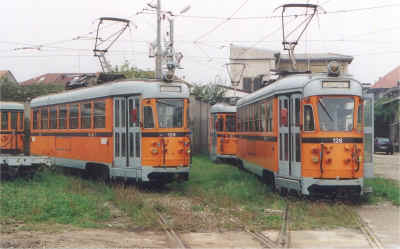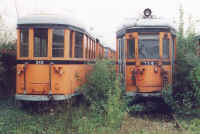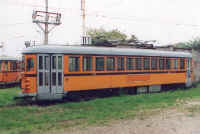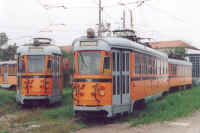
The word "Littorina" refers to three types of interurban motor cars built in the '30s and '40s. These types are called Breda, OEFT and OMS from the name of the builder. Three of these cars, OEFT 122 and OMS 124 and 128, are visible in this photo, taken in the Deposito Desio on October 7th 2001.
The six cars from series 110-115 were built by Breda in 1935 with TIBB electric equipment, engines and bogies. They were the most comfortable interurban cars built at that time and gained the nickname "Littorina". They were used mainly on Milano – Monza line until its dismission (October 2nd 1966), then they ran on Milano – Carate, primarily on Milanino branch. Since the provisorily closing of that service on March 19th 1999, the surviving car 114 was set aside in Deposito Desio. At origin the cars were painted in light and dark green and were equipped with trolley poles. In the '70s the cars were painted in orange and in 1986 the trolley poles were replaced by the pantographs.
 |
Breda 114 is sadly settled aside in the fenced area of the Deposito Desio with other interurban equipment, like trailer type "Porte al centro" 243 that stands on the left. October 7th 2001. |
OEFT series 116-123 were built by Officine Elettroferroviarie Tallero in eight units in 1937 following the same scheme of Breda cars. This second series of Littorine are a bit heavier than Breda. Like their sisters, these cars were used on Milano – Monza and then on Milano – Milanino until March 19th 1999 when the last existing car (122) was set aside. Like most of interurban rolling stock, they were originally painted in light and dark green, in orange from the '70s, and they had trolley poles until 1986, then pantographs.
Together with these six cars, Tallero delivered four similar trailers series 307-310.
 |
OEFT 122 in the Deposito Desio. October 7th 2001. |



Littorine Breda and OEFT in the '70s and today
These Littorine were built by Officine Meccaniche Stanga in 1942 in five units numbered from 124 to 128. They started service on Monza line to end their runs on the Milanino. They have a modern exterior look than Breda and OEFT and their electric equipment was built by CGE instead of TIBB. Today two only cars survive: 124 and 128, set aside in the Deposito Desio. Livery and current collectors changed like other Littorine.
 |
The two survivor OMS: cars 124 and 128, always in the Deposito Desio on October 7th 2001. |



Littorina OMS in the '70s and today
These were other two types of Littorine (OMS series 130-139 and OEFT series 501-512) still existing but with a new face as they were used in the '60s to create the two series of Bloccati 500 and 800.
The Littorine OMS series 130 were built by Officine Meccaniche Stanga with CGE electric equipment and TIBB bogies in 1941, a year before series 124-128. They had only a door per side. When they were used to create the Bloccati 800 they were renumbered from 801 to 810. Today only cars ex 130, 131, 133 and 135 survive with the new numbers 801, 802, 804 and 806, all hosted in Deposito Desio.
The Littorine OEFT series 500 were built in 1953 by Officine Elettroferroviarie Tallero with TIBB electric equipment and bogies. They are the most modern interurban cars and maintained the same number after transformation in cab-less motor car for Bloccati 500. All of them survive and are in service but 508, set aside in Deposito Varedo after a crash of its trailer 543.
| Littorine tenical characteristics | |||
|---|---|---|---|
| Type | Breda | OEFT | OMS |
| Year | 1935 | 1937 | 1942 |
| Original amount | 6 | 8 | 5 |
| Present amount | 1 | 1 | 2 |
| Classification | 110-115 | 116-123 | 124-128 |
| Length | 15 200 mm | 15 200 mm | 15 200 mm |
| Width | 2 320 mm | 2 320 mm | 2 300 mm |
| Mass | 22 300 kg | 24 000 kg | 24 000 kg |
| Maximum speed | 65 km/h | 65 km/h | 65 km/h |
| Body builder | Breda | Officine Elettroferroviarie Tallero | Officine Meccaniche Stanga |
| Bogie builder | TIBB | TIBB | TIBB |
| Axles | 4 | 4 | 4 |
| Brake | Pneumatic | Pneumatic | Pneumatic |
| Electric equipment builder | TIBB | TIBB | CGE |
| Engine builder | TIBB | TIBB | TIBB |
| Engine amount | 4 | 4 | 4 |
| Total power | 221 kW | 221 kW | 221 kW |


© 2003 Ivan Furlanis
Last changes: December 2003